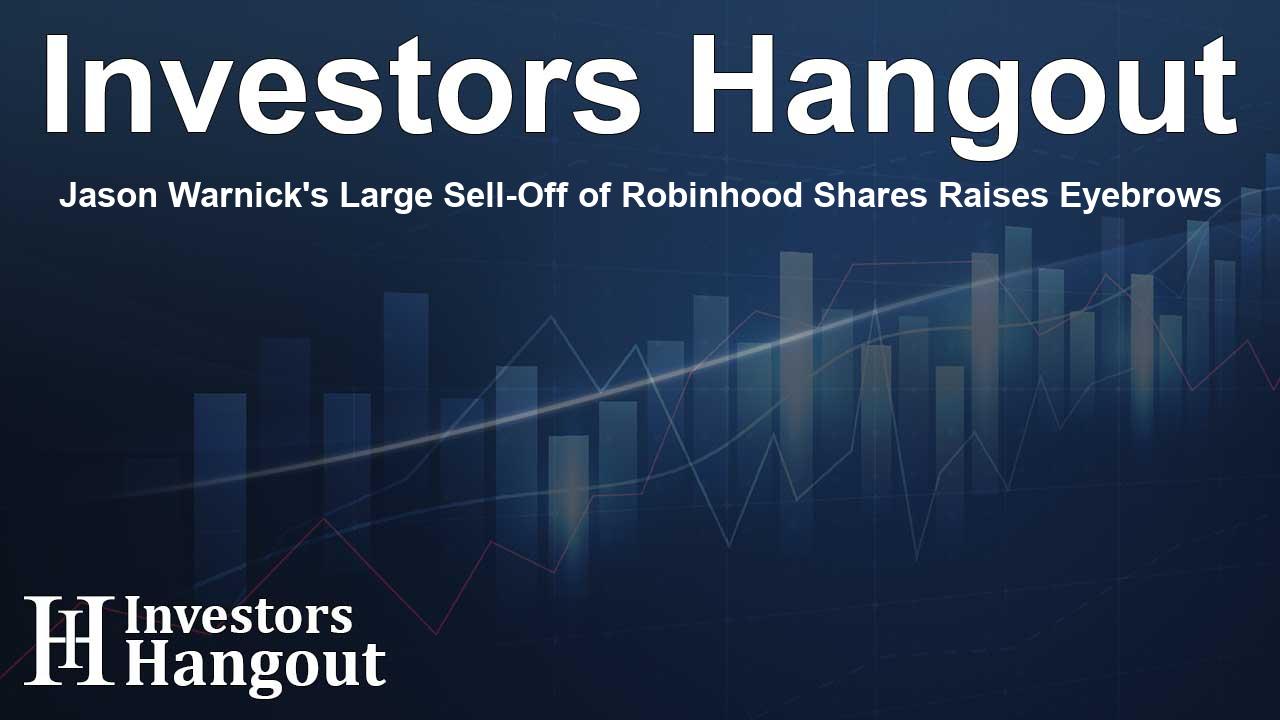Jason Warnick's Large Sell-Off of Robinhood Shares Raises Eyebrows

Insider Selling Activity at Robinhood Markets
Recently, significant insider trading activity came to light involving Jason Warnick, the Chief Financial Officer of Robinhood Markets (NASDAQ: HOOD). In a recent filing with the SEC, it was reported that Warnick opted to sell a considerable amount of stock, totaling 100,000 shares. This transaction amounted to an impressive $11,092,900, creating noticeable attention among investors.
Understanding the Impact of Insider Sales
The Sale Details Explained
Jason Warnick’s large sell-off of Robinhood stock has raised questions among market watchers and investors alike. Sellers in the market often come under scrutiny, making such trades a potential signal of the company's internal confidence level among its executives. While selling stocks can sometimes indicate a lack of confidence in future performance, it could also be a strategic financial decision based on personal financial planning.
Current Market Performance of Robinhood
As of the recent reports, shares of Robinhood Markets were trading down by 6.08%, with a value of approximately $100.97. This data highlights the volatility commonly associated with tech-driven financial platforms and can often reflect the broader market sentiment.
Company's Financial Landscape
Revenue Growth Insights
Looking at the company’s financial performance, there has been notable revenue growth. The latest figures revealed a remarkable revenue growth rate of 45.01% over a recent three-month period. This indicates a significant increase compared to many competitors in the financial services space.
Profitability Metrics
Gross Margin: Robinhood’s gross margin impressively sits at 85.74%, signaling effective cost management and enhanced profitability relative to peers.
Earnings per Share (EPS): However, when evaluating the company’s earnings capability, it is worth noting that Robinhood’s current EPS stands at 0.44, which is below the broader industry average, possibly indicating challenges in sustaining earnings growth.
Debt Management and Valuation Insights
Debt-to-Equity Ratio Analysis
The company maintains a favorable debt-to-equity ratio of 1.57, which is below industry norms. This metric is an encouraging indicator of financial stability and structural soundness.
Valuation Metrics Explored
Price to Earnings (P/E) Ratio: At 54.57, Robinhood’s P/E ratio underscores that its stock is trading at a premium relative to peers, highlighting market confidence.
Price to Sales (P/S) Ratio: The firm also exhibits a P/S ratio of 27.48, suggesting that investors may view the stock as overvalued based on sales performance.
EV/EBITDA Ratio: With an EV/EBITDA ratio of 59.11, Robinhood’s market valuation suggests strong investor sentiment that exceeds typical industry averages.
Significance of Insider Transactions
It is important not to rely solely on insider transactions for investment decisions; however, they can provide crucial insights into an investor's perspective regarding the company’s future. When executives feel bullish and buy shares, it often indicates their optimism about the company’s trajectory.
Conversely, while insider sell-offs, such as Warnick’s, do not necessarily equate to negative sentiment, they may stem from various reasons, such as personal financial planning.
Understanding SEC Filing Codes
When reviewing SEC filings, investors pay close attention to transaction codes. A P indicates purchases, S signifies sales, while C references the conversion of options, and A corresponds to any grants or securities acquired from the company.
Frequently Asked Questions
What was the total value of Jason Warnick's stock sale?
Jason Warnick's stock sale totaled approximately $11,092,900.
How did Robinhood’s stock perform after the insider sell?
Robinhood's stock was noted to be down 6.08%, priced at $100.97 at the time of reporting.
What does Robinhood’s revenue growth indicate?
The company achieved a remarkable revenue growth rate of 45.01% over a recent three-month period, showing significant top-line growth.
What is the company's gross margin?
Robinhood's gross margin stands at 85.74%, which reflects strong profitability management.
Why are insider transactions important for investors?
Insider transactions can provide insights into the executives' confidence in a company's future performance, although they shouldn't be the sole basis for investment decisions.
About The Author
Contact Dylan Bailey privately here. Or send an email with ATTN: Dylan Bailey as the subject to contact@investorshangout.com.
About Investors Hangout
Investors Hangout is a leading online stock forum for financial discussion and learning, offering a wide range of free tools and resources. It draws in traders of all levels, who exchange market knowledge, investigate trading tactics, and keep an eye on industry developments in real time. Featuring financial articles, stock message boards, quotes, charts, company profiles, and live news updates. Through cooperative learning and a wealth of informational resources, it helps users from novices creating their first portfolios to experts honing their techniques. Join Investors Hangout today: https://investorshangout.com/
The content of this article is based on factual, publicly available information and does not represent legal, financial, or investment advice. Investors Hangout does not offer financial advice, and the author is not a licensed financial advisor. Consult a qualified advisor before making any financial or investment decisions based on this article. This article should not be considered advice to purchase, sell, or hold any securities or other investments. If any of the material provided here is inaccurate, please contact us for corrections.
